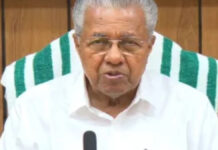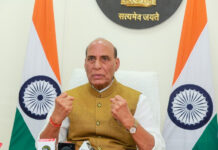The Shiv Sena, on Sunday, said it now had the “remote control of power” in Maharashtra despite getting fewer seats in the 2019 assembly polls when compared to 2014. During the first Sena-BJP government in the state, between 1995 to 1999, the term remote control was regularly used for and by the late party patriarch Bal Thackeray to explain the chain of command in the dispensation. The two allies are in the midst of tough negotiations after the BJP returned a less-than-impressive performance in the assembly polls, results of which were declared on October 24, with 105 seats against 122 in 2014. Among Sena’s demands is written assurance from the BJP on “equal sharing of power”, which could possibly include equal division of the chief ministerial tenure. In his column ‘Rokhthok’ in Sena mouthpiece ‘Saamana’, Sanjay Raut said, “The Sena won lesser seats this time, 56 compared to 63 in 2014, but it has the remote control of power”. “The dream that the Shiv Sena will drag itself behind the BJP is busted (after poll results). A cartoon showing a tiger (Sena’s identity) holding a lotus (BJP’s symbol) in its hand tells a lot about the current scenario. Not taking anyone for granted is the message,” he said in his column. Raut is the executive editor of Saamana and also the chief whip of the party in Parliament. The column hinted that the Sena would stay firm on its demands before government formation with the BJP. Hitting out at its ally further, he wrote, “The BJP’s strategy of contesting 164 seats and winning 144 of them was rejected by voters. The election result is the defeat of unethical thoughts of increasing the tally by getting key Congress-NCP leaders to join the BJP, by luring them or threatening them.” He said the defeat of NCP-turned-BJP leader Udayanraje Bhosale in the Satara by-poll was a message to those who were assuming they could “do whatever they wanted” to win polls. Bhosale had won the 2019 Lok Sabha polls from Satara on an NCP ticket before quitting and joining the BJP, necessitating a by-poll in which he was trounced by NCP’s Srinivas Patil. Those whose heads are in the clouds will end up like Udayanraje was the message of the 2019 assembly polls, he said in the column. Raut also claimed that people did not like comments like “ending the Pawar pattern”, and the dislike was expressed through the ballot, especially in rural areas where the opposition did well. “The Shiv Sena stopped the BJP’s plans of forming a government on its own in the state in 2014. In 2019, it was Sharad Pawar who did the same,” Raut said.

Dogra Herald is the media of J & K, breaking language and geographical barriers, connecting J & K to the rest of India.
0191 245 4946
info@dograherald.com
Latest articles
Corporate, private sectors have continuously contributed to strengthening health services: PM Modi
iamjkstarr - 0
NEW DELHI: Prime Minister Narendra Modi on Thursday said that India's corporate sector, private sector and social organizations have continuously contributed to...
Commotion in J&K Assembly, CM says MLA’s Private Resolution on Art 370 doesn’t stand
DOGRA HERALD BUREAUSrinagar, Nov 4J&K Chief Minister Omar Abdullah, while commenting on PDP MLA Waheed ur Rehman Parra’s resolution opposing abrogation of...
Election Rules Row: Supreme Court orders EC to preserve video clips of polling
DH NEWS SERVICENew Delhi, Jan 31The Supreme Court on Friday directed the Election Commission of India to preserve video clips of the...


























